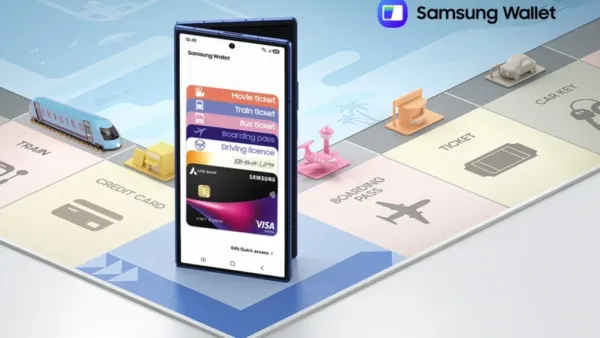
Highlights
- The Samsung Wallet update for India aims to simplify payments and make them device-based.
- By integrating UPI onboarding, biometric authentication, and expanding Tap & Pay, Samsung minimized friction at key points.
- If the South Korean major successfully deploys it, the Samsung Wallet could emerge as the go-to payment app for most Galaxy users.
Samsung is repositioning the Galaxy phone-based Samsung Wallet in India from a mere passive card holder to an integrated payments hub.
In a late-October 2025 release, Samsung announced three significant tweaks: UPI onboarding during out-of-box device setup, biometric (PIN-free) authentication for regular transactions, and broader Tap & Pay support encompassing FOREX (prepaid foreign exchange) cards and new bank partners.
Collectively, these changes are intended to minimize friction for users, broaden Samsung Wallet’s utility for travel, and enhance device-level control over payments.
UPI onboarding: payment ready from boot
One of the most apparent shifts is that Samsung will provide UPI registration as part of the first-device setup process for new Galaxy devices. Rather than setting up the phone, then searching for a banking app and connecting UPI afterward, users can register and be ready to pay the moment they unwrap the device.
These changes matter a lot for Samsung Wallet, as onboarding is considered a point of friction. Shifting the UPI installation to a first-run experience eliminates many steps, no longer requiring additional installs and reducing manual inputs, thereby getting more people actually to begin using digital payments right away. For Samsung, it also means the Samsung Wallet becomes the default payment entry point on Galaxy devices, a subtle but effective way to make the Wallet app a go-to application.
From a UX point of view, this is very clever, as it leverages the “new device” experience when the user is already in and converts engagement into active use. For newcomers to digital payments, it reduces the barrier to entry; for heavy users, it just speeds things up.
Biometric, PIN-free authentication: convenience without compromise

Samsung Wallet will support biometric verification—fingerprint and face unlock—to authenticate regular Wallet and UPI operations, eliminating the need to enter a PIN every time. Samsung emphasizes that this process is protected by the device’s secure hardware and Samsung Knox, its defense-grade security solution.
In practice, it makes day-to-day transactions, such as groceries, public transport, and small purchases, quicker and more accessible. This is a significant convenience boost, and it usually reduces abandoned checkouts caused by PIN entry on a busy keyboard or in a noisy setting.
Some caveats to keep in mind include fallback methods (what if the biometric fails), transaction limits associated with more secure authentication, and how disputes are handled when biometrics replace a PIN. Samsung argues that safe hardware and Knox mitigate these issues, but regulators and industry will monitor the deployment to ensure compliance with industry requirements.
Tap & Pay goes international: FOREX cards and new banking partners.
Samsung is also broadening Tap & Pay to include foreign credit and debit cards. The Samsung Wallet will support contactless payments with prepaid FOREX cards (for visiting travelers), including AU Bank cards, on its list of supported cards. FOREX card support, enabled via a payments partner, allows users to tap their Galaxy phone while traveling without carrying the physical FOREX card.
There are two major wins here. Travelers can use their phones for contactless payment abroad, and Samsung’s phones gain value as travel accessories, becoming more than just local payment apps. The company also announced that tokenization for online merchant checkout will be enabled, allowing Samsung Wallet to provide a tokenized card for web or in-app payments, so the card number does not need to be typed or shared at checkout.
Tokenization matters because it diminishes the attack surface. Merchants receive a token instead of a card number, reducing the risk of exposed card information. The effect relies on how extensively merchants and banks implement the tokenized checkout process.
What this means for users, banks, and the broader ecosystem
For consumers, it means easier onboarding, quicker regular payments, and fewer physical cards to carry while traveling. New Galaxy purchasers get set up to make payments sooner, and regular travelers benefit from contactless international transactions.
In terms of banks and fintech, it brings equal opportunities and challenges. Being included in Samsung Wallet exposes banks to millions of Galaxy users, and it brings Samsung closer to the middle of the payment experience. Banks will need to consider the commercial and operational terms of tokenization, biometric flows, and integration with Samsung’s platform.
This momentum also pushes more payment activity onto device-native rails (device tokens and wallets) rather than apps. This can significantly accelerate the adoption of secure standards such as tokenization. Still, it also leaves questions about competition, platform dependency, and how regulators facilitate consumer protection and transparent dispute resolution.
Security and rollout
Samsung highlights that these capabilities are based on Samsung Knox and the Galaxy security stack. That is a technical assurance, as Knox is a hardware-protected security environment that isolates sensitive data and keys.
Nevertheless, the real-world security narrative will be tested by device qualification, the details of biometric fallbacks, transaction limits, and how banks implement their AML/KYC policies during onboarding through the device setup flow.
Samsung has stated that these features will be rolled out to supported Galaxy devices in phases. The timing, the specific device list, and the complete list of bank and merchant partners will determine how rapidly these features alter daily behavior.
-
India’s breast cancer awareness must go beyond symbolism

-
Israeli envoy calls UN advisor Albanese ‘a witch’

-
Video: Three-year-old escapes unhurt after minor runs car over her in Gujarat

-
17 stranded Indian tourists rescued from Annapurna Base Camp in Nepal

-
BJP Seeks Ban On Rahul’s Campaign Over ‘Modi-Dance’ Remark, Congress Reminds Of ‘Mujra’ Barb
